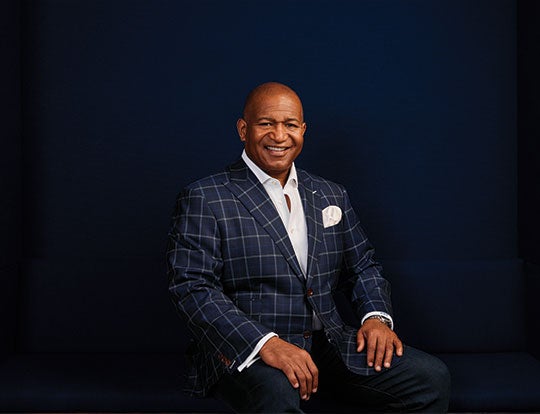Full Potential
The Doerr Institute for New Leaders looks forward to a new era.
Spring 2024
Created by a then-record $50 million donation in 2015 by alumni John Doerr ’73 and Ann Doerr ’75, the Doerr Institute is committed to elevating the leadership abilities of Rice students by providing development driven by evidence-based approaches and resulting in measurable impacts. The institute, now led by Bernard “Bernie” Banks, serves all Rice students — undergraduate and graduate — regardless of age or experience, and at no cost.

Q&A: Bernard “Bernie” Banks, Director, Doerr Institute
By Andrew Bell
A noted expert on leadership and organizational change, a sought-after speaker, and a retired brigadier general in the U.S. Army, Banks joined the Doerr Institute as its director in January. We spoke with him about the institute’s mission.
How important is it to develop leadership skills in students on campus?
One of the things that I’m fond of helping anyone to understand is that leadership is not simply a role you occupy. It’s a way that you are. There have been countless definitions that have been crafted [to describe] the phenomenon we call leading, and not one of them says ‘must be in charge.’ It’s about helping students to understand that when we talk about leading, we’re simply talking about amplifying one’s ability to be successful in their influence attempts with others.
What is your vision for the Doerr Institute moving forward?
The Doerr team’s vision is to be Rice’s catalyst for ensuring the university is the absolute best in the world at using empirical science to develop the leadership capabilities of its community in a very intentional way. When the world thinks about who excels at intentional leader development, ours is a name that should always come to the fore right away.
Leadership and Honor Cultures
By Deborah Lynn Blumberg
Social psychologist and data scientist Ryan Brown ’93, along with postdoc Aaron Pomerantz, is studying the relationship between leadership and so-called “honor cultures” — those that place a greater emphasis on defending their reputations. Classic examples include Afghanistan and other Middle Eastern countries, Brown says, as well as countries around the Mediterranean and throughout Central and South America.
In ongoing research, Brown is looking at the extent to which people will tolerate misbehavior by leaders who uphold the core values of an honor culture. “If leaders are tough, and they’re willing to go to great lengths to defend people, the hypothesis is that people will be a lot more tolerant of misbehavior, including perhaps illegal and immoral behavior,” he says.
It’s research that’s timely right now, as countries worldwide grapple with a litany of leader misbehaviors, from campaign financing transgressions to sexual misconduct. “Current events are convincing me that it takes a pretty high level of severity to say ‘enough is enough,’” says Brown.
Learn more at doerr.rice.edu.
